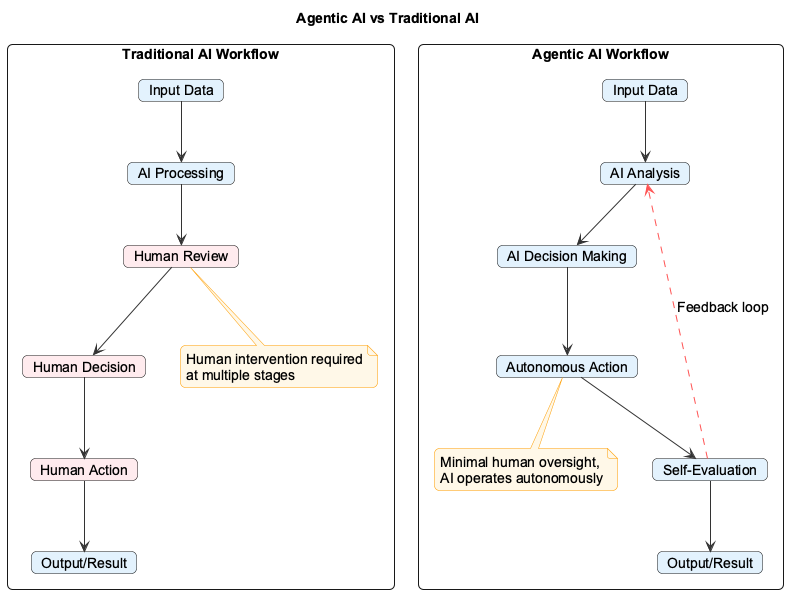The Agentic AI Revolution: What SMEs Need to Know
The Agentic AI Revolution: What SMEs Need to Know
Feb 18, 2025
As a fractional CTO working with small and medium-sized enterprises, I've witnessed firsthand the transformative impact of AI technologies on businesses across sectors. Among these innovations, Agentic AI stands out as perhaps the most significant development for SMEs looking to enhance operational efficiency without massive investments in specialized teams. Let's explore what this technology means for your business.
What is Agentic AI?
Agentic AI refers to AI systems that can autonomously perform tasks and make decisions within defined parameters. Unlike traditional AI that requires constant human oversight at each step, agentic AI can handle complex workflows independently, learning and adapting as it goes.
Think of traditional AI as a powerful calculator that needs a human to press each button, while agentic AI is more like an executive assistant who understands your goals and can independently work toward them, checking in only when necessary.
 Figure 1: Comparison between traditional AI systems requiring human intervention at each step versus agentic AI systems that autonomously execute multi-step workflows with minimal oversight.
Figure 1: Comparison between traditional AI systems requiring human intervention at each step versus agentic AI systems that autonomously execute multi-step workflows with minimal oversight.
Practical Applications for SMEs
The key to successfully implementing AI in SMEs is focusing on practical, value-driven applications that address specific business challenges. Here are some areas where we've seen immediate benefits:
-
Customer Service Automation: Using AI agents to handle routine inquiries while escalating complex issues to human agents. Companies implementing agentic AI in customer service have seen a 35% reduction in response times and a 28% increase in customer satisfaction scores, according to a 2024 study by Gartner.
-
Document Processing: Automating the extraction, classification, and routing of information from documents. A manufacturing client of ours implemented an agentic AI solution that reduced their invoice processing time from 4 days to just 2 hours, resulting in an average 60% reduction in processing time.
-
Workflow Automation: Creating smart processes that can adapt to changing conditions and requirements. McKinsey reports that businesses using agentic AI for workflow automation have achieved productivity gains of 20-40% in knowledge work tasks. One financial services client automated their compliance monitoring process, reducing manual review time by 65% while improving accuracy by 28%.
-
Market Intelligence: Deploying AI agents to continuously monitor industry news, competitor activities, and market trends to provide actionable insights. A retail client used this approach to identify emerging product trends three months before their competitors, resulting in a 15% increase in new product sales.
Implementation Considerations
When implementing agentic AI solutions, we recommend a pragmatic, results-focused approach:
-
Clear Objectives: Define specific business problems you want to solve with measurable outcomes. For example, one manufacturing client identified a 15% error rate in their quality control process that we targeted with an agentic AI solution, reducing errors to under 3% within two months.
-
Start Small, Scale Fast: Begin with pilot projects that can demonstrate value quickly and build confidence. A healthcare provider started with automating just their patient appointment scheduling, which delivered a 30% reduction in no-shows before expanding to other patient engagement processes.
-
Focus on Integration: Ensure your AI solution connects seamlessly with existing systems. The most successful implementations we've seen leverage current data and workflows rather than requiring entirely new infrastructure.
-
Measure Results Rigorously: Track key metrics to ensure the solution delivers real value. Establish baseline measurements before implementation and monitor progress at regular intervals, making adjustments as needed.
Looking Ahead
The future of agentic AI is promising, with the market expected to grow at a CAGR of 38% through 2030 according to Grand View Research. However, it's important to approach it pragmatically.
While the technology is powerful, success ultimately depends on choosing the right applications - those that solve real business problems and deliver measurable value. In our experience, companies that focus on specific use cases with clear ROI metrics consistently outperform those implementing AI for its own sake.
As your fractional CTO partner, we're here to help you navigate these opportunities and implement solutions that make sense for your business context, budget, and growth objectives. The agentic AI revolution isn't about replacing human workers - it's about augmenting their capabilities and freeing them to focus on higher-value, creative work.
References
- Gartner, "The Impact of Agentic AI on Customer Experience," 2024
- McKinsey & Company, "The Economic Potential of Generative AI," June 2023
- Grand View Research, "Agentic AI Market Size & Forecast Report," 2024
- MIT Sloan Review, "Agentic AI: A New Paradigm for Business," 2024
- Harvard Business Review, "Small Businesses, Big AI Impact," January 2025